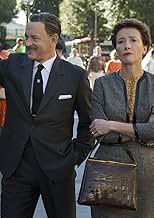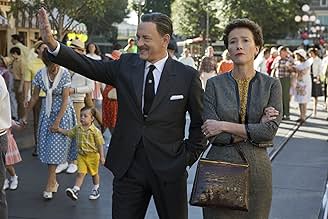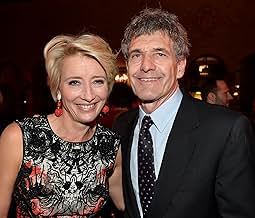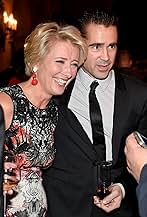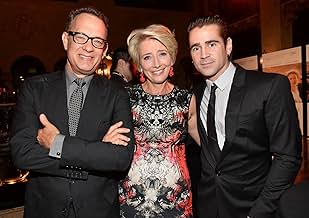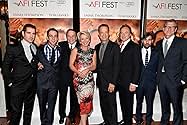La autora P.L. Travers reflexiona sobre su infancia después de reunirse a duras penas con Walt Disney, quien busca adaptar sus libros de Mary Poppins para la gran pantalla.La autora P.L. Travers reflexiona sobre su infancia después de reunirse a duras penas con Walt Disney, quien busca adaptar sus libros de Mary Poppins para la gran pantalla.La autora P.L. Travers reflexiona sobre su infancia después de reunirse a duras penas con Walt Disney, quien busca adaptar sus libros de Mary Poppins para la gran pantalla.
- Dirección
- Guión
- Reparto principal
- Nominado para 1 premio Óscar
- 13 premios y 74 nominaciones en total
Fuschia Sumner
- Flight Attendant
- (as Fuschia Kate Sumner)
Reseñas destacadas
As with 'The Day of the Jackal', anyone with a basic knowledge of history will know how this ends; just as anyone familiar with the film that eventually emerged from this 1961 meeting of an irresistible force and an immovable object will know both the outcome and who won the creative battles.
We actually learn early on when she laments that "I want to keep my house" that Disney had Travers over a barrel; while the fact that there was never a sequel to 'Mary Poppins' tells us all we need to know about what she reallly thought of the film that emerged.
We actually learn early on when she laments that "I want to keep my house" that Disney had Travers over a barrel; while the fact that there was never a sequel to 'Mary Poppins' tells us all we need to know about what she reallly thought of the film that emerged.
Walt Disney Pictures rarely aims for the Best Picture crown, being more a company focused on profits and sustaining its wildly popular brand. To make you haters hate more: they've earned $4 billion this year already and this includes the $200 million loss of Lone Ranger). They usually only distribute the movies that have a shot at Academy Awards immortality, with The Help (A Dreamworks film) being the latest example of a nominee and No Country For Old Men being their latest example of a winner.
But with Saving Mr. Banks, Disney is going the whole nine yards. With a stellar cast, seemingly endless budget (Giving John Lee Hancock a much-less stressful job in directing), high production value, and heavy dosage of drama that hides beneath the happier movie trailers, this film stands as one of the better dramas of the year and a sure-fire Oscar-contender. Touching upon the tissue-happy themes of forgiveness, family, and seeking happiness in a miserable world, prepare for waterworks throughout the two hours.
What makes this movie work more than anything else is the screenplay that didn't start in the studios of Disney, allowing for a more accurate portrayal of the true story behind the making of the masterpiece Mary Poppins----even if the entire world knows that with the backing of Disney some details will be left out. Kelly Marcel and Sue Smith weaved out an engaging story full of crisp dialogue and skillfully avoids becoming too overblown or too overdramatic. And whenever the movie gets close to being all-out depressing, we get treated to humorous moments here and there to keep the audience in check.
In a movie about artists that are addicted to their craft, you need actors that work with the same type of fervor. Emma Thompson despite not getting top billing gets the most screen time, gets the toughest job, and delivers the ultimate performance. She becomes very dislikable and yet sympathetic at the same time, and it is impossible to see anyone other than Thompson deliver this type of impact. Tom Hanks in an Oscar-baiting year does a superb job portraying the icon planet Earth knows and loves as he gives Walt Disney a humanized performance that separates the flawed man from the myth the Disney Company has feverishly worked to this day to protect. The rest of the cast does not disappoint, and we even see Colin Farrell potentially impress some Academy voters as the loving yet extremely defective father figure.
Disney's protection of its brand is the sole reason why Saving Mr. Banks could never ever ever ever ever ever be produced or made by anybody else. But luckily for all viewers, Disney doesn't pull back many punches in delivering the story behind the complex and conflicted making of Mary Poppins. It will be deep in the Golden Globes and the Academy Awards but ultimately indeed deserves the praise—even if you won't see all the details behind the true story on screen.
But with Saving Mr. Banks, Disney is going the whole nine yards. With a stellar cast, seemingly endless budget (Giving John Lee Hancock a much-less stressful job in directing), high production value, and heavy dosage of drama that hides beneath the happier movie trailers, this film stands as one of the better dramas of the year and a sure-fire Oscar-contender. Touching upon the tissue-happy themes of forgiveness, family, and seeking happiness in a miserable world, prepare for waterworks throughout the two hours.
What makes this movie work more than anything else is the screenplay that didn't start in the studios of Disney, allowing for a more accurate portrayal of the true story behind the making of the masterpiece Mary Poppins----even if the entire world knows that with the backing of Disney some details will be left out. Kelly Marcel and Sue Smith weaved out an engaging story full of crisp dialogue and skillfully avoids becoming too overblown or too overdramatic. And whenever the movie gets close to being all-out depressing, we get treated to humorous moments here and there to keep the audience in check.
In a movie about artists that are addicted to their craft, you need actors that work with the same type of fervor. Emma Thompson despite not getting top billing gets the most screen time, gets the toughest job, and delivers the ultimate performance. She becomes very dislikable and yet sympathetic at the same time, and it is impossible to see anyone other than Thompson deliver this type of impact. Tom Hanks in an Oscar-baiting year does a superb job portraying the icon planet Earth knows and loves as he gives Walt Disney a humanized performance that separates the flawed man from the myth the Disney Company has feverishly worked to this day to protect. The rest of the cast does not disappoint, and we even see Colin Farrell potentially impress some Academy voters as the loving yet extremely defective father figure.
Disney's protection of its brand is the sole reason why Saving Mr. Banks could never ever ever ever ever ever be produced or made by anybody else. But luckily for all viewers, Disney doesn't pull back many punches in delivering the story behind the complex and conflicted making of Mary Poppins. It will be deep in the Golden Globes and the Academy Awards but ultimately indeed deserves the praise—even if you won't see all the details behind the true story on screen.
This movie is much more than and definitely deeper than one would suspect from the 'syrupy' trailers most people have seen. The understory, gradually revealing the early life of P.L. Travers, the author of Mary Poppins, and depicting how the people in her dysfunctional family led her to write Mary Poppins, is the true core of this movie. I will never see Mary Poppins in quite the same way. All of the acting is superior, and the score is excellent. This is not the shallow, childlike movie that many will expect. I would not recommend it for children 11 and under, depending on the child. Otherwise, I highly recommend this movie, even if you are not a big fan of the original Mary Poppins film.
Once upon a time (seeing as though that's how all fairy tales seem to start), there lived a boy from Missouri, called Walt Disney. This boy had a piece of paper with a mere sketch of a mouse upon it. Who ever would have thought that this was to be the start of such a great legacy? In 1961, Walt Disney invited P.L Travers, the author of "Mary Poppins", to his California studios to discuss the possibility of acquiring the rights to her book - a discussion that Mr. Disney had initially sparked twenty years prior. For those two decades, the proud author refused to depart with her precious work in fear of Hollywood's mutilation of it and repeatedly told Mr. Persistent to go 'fly a kite
up to the highest heights'. However, when sales of her book begin to dwindle and with a rough economic climate ahead, Travers reluctantly agreed to travel across the Atlantic to hear what the impresario had to say. This untold backstory of how Travers' classic work of literature made it to the big screen provides the substance for John Lee Hancock's Saving Mr. Banks. Here, we have an American icon that plays an American icon. Two-time Academy Award winner Tom Hanks delivers extraordinary sense of character as he renders Mr. Walt Disney with expert attention to detail. "There's a lot of voice work, the way he walks, the body positions, the way he holds his hands, the way he touches his moustache. How he phrases things and lets sentences roll off the end", Hancock remarks - and so Tom Hanks becomes the public face for Walt Disney and we learn of the man behind the mask (with two fluffy ears). Our central protagonist is Mrs. P. L Travers, played by Emma Thompson (who similarly boasts two Academy Awards). "She was a wonderful case study, requiring so many different shades. She was just so complex. She's one of the most complicated people I've ever encountered", says the British actress. Her rendition of a tetchy and cantankerous author who's plagued by the memories of her past is brilliantly executed. As narrative flashbacks delve into Mrs. Travers' childhood, we soon realise the true depth of her literary creation, Mary Poppins. Mr. Banks explores the bond between a young Travers (then Helen) and her drunkard father, Travers Goff (exceptionally played by Colin Farrell). Like a puzzle, the story is pieced together, bit by bit and we learn that her deep-seated adoration for her father is what lies at the heart of her magical masterpiece. Demonstrating that her novel holds such personal significance, Travers continues to exercises a stubborn reluctance to hand the rights to her book over to what she considers to be a dollar-printing machine. The straight-talking novelist is repulsed by Disney's empire and this is only intensified when the entertainment wizard showers her in all kinds of ridiculous merchandise. As Walt Disney haplessly pursues Travers, unsettling the adamant writer with his vision of the film, it seems that he will never obtain the rights to make the movie of Mary Poppins. We are, of course, watching this in hindsight and the knowledge that the book was made into a successful film adds a magical quality to the experience and permits laughter as it plays on dramatic irony; and there are some real gems for the Disney die-hards. Walt Disney made a promise to his daughter to make the movie of Mary Poppins. As the likelihood of fulfilling this promise fades into the distance, the entertainment-guru reaches into his own childhood and discovers a new, more personal connection to the emotionally troubled Travers. In order to break away from a life dictated by her past, Travers agrees to sign the waiver so that one the most lovable films in cinematic history can be made. This biographical dramedy stands as a poetic tale of hope, which ultimately gives testament to the might of the mouse house and conveys the magical idea that everybody has a story to tell. Making memories is what Disney is all about and for its 125-minute runtime, we re-visit old memories and we also create new ones. With all the conventions of a family film (after all, this is Disney), Saving Mr. Banks is supercalifragilisticexpialidocious! (Couldn't resist).
Despite watching the trailer and knowing the broad story, Saving Mr. Banks still managed to surprise me. It's a beautiful, tender film that manages to be sad without being mawkish, funny without detracting from the emotion and with far greater depth than expected. Unfolding the story of Walt Disney's attempt to persuade P.L. Travers to sell him the rights to her beloved Mary Poppins, Saving Mr. Banks is a delightful film that is deceptively emotional and flows smoothly enough to be entirely engaging. Travers (Emma Thompson) thwarts Disney's (Tom Hanks) attempts to secure the rights for twenty years until a flatlining bank balance and a mildly panicking agent persuade her to at least consider Disney's proposition or lose her home with certainty. Whisking her to Hollywood and bombarding her with all things Disney, the master of the House of Mouse spares no expense or effort to woo Mrs Travers and persuade her to allow him to keep his promise to his daughters to film the books they loved so much. But nothing prepares him for the stubborn, exacting curmudgeon who challenges him at every twist and turn and demands and demeans in equal measures. After the recent Captain Phillips, in which Hanks was astounding, there is a very good chance that he may join an exclusive group (of twelve so far, including co-star Emma Thompson) of actors to be nominated for two Oscars in the same year. Even more rarely, he'll deserve both nominations! Quite simply, it is impossible to imagine another actor in the role of Uncle Walt. He oozes charisma and his smile is used for so much more than merely expressing happiness. There is a genuine warmth to Hanks' performance and this is one of those rare occasions where I temporarily forgot I was watching him. He's been a very good actor for many, many years, but this year I've had to reassess my opinion of him and state that he has transcended his deserved 'movie stardom' to become a very fine actor indeed. Unsurprisingly (and most welcome), Hanks is matched every single step of the way by Thompson. There is a magical thawing in her Travers in the course of Saving Mr. Banks where she pokes her head out of her hard, crispy chrysalis and threatens to become a warm(ish), witty woman. Early on in the film, it is difficult to like Travers as her demands become more extreme, her retorts more cutting and her demeanour downright unpleasant, but Kelly Marcel and Sue Smith's screenplay weaves the story of the film rights with the tale of Travers' troubled childhood to give reason for her crustiness and context to her literary creation. It is this aspect of Saving Mr. Banks that surprises most and completes the film. Director John Lee Hancock (The Blind Side) approaches each side of his female protagonist's life very differently and her buried history is shot in muted, dusty colours with a jagged Western romanticism that tempers the bleak happenings that shaped the girl into the woman. Colin Farrell is on his best form for years as Travers Goff, the drunk father who lives in his own fantastic world of imagination and adventure to escape the harsh reality of the real world. He is a man who fails consistently and knows it, but loves his daughter unequivocally. As with Hanks and Thompson, the chemistry between Farrell and Annie Rose Buckley (playing Ginty, the young Travers) is effortlessly beautiful. The casting is just one of the joys of Saving Mr. Banks, with Paul Giamatti chief amongst the supporting actors as Travers' driver, Ralph, a doleful puppy in human form that responds to every brush-off and verbal slap with another smile and encouraging word. In the studio Bradley Whitford as screenwriter Don DaGradi and B.J. Novak and Jason Schwartzman as the Sherman brothers bring more gentle humour as Travers' desperate, unwilling adversaries. There's no lazy leaning towards slapstick or cheap shots, rather Hancock steers their scenes gently allowing both the frostiness and the occasional sprinkles of sunlight to sparkle with sincerity. There are hints of Travers' adult life beyond her books but, though comments remain, it feels as though the backstory was excised for the final cut and so I came away from the film feeling that something was missing. The final act is perhaps a little too tidy; it glides towards a resolution too smoothly and nothing is made of the rumoured aftermath of the deal, but these are minor niggles in a beautiful film that carries one along and moistens the eyes occasionally. Saving Mr. Banks is an unqualified success. It is a joy to watch and leaves one hoping that Mary Poppins earns yet another screening in this year's Christmas TV schedule.
¿Sabías que...?
- CuriosidadesP.L. Travers never did warm up to the song "Let's Go Fly a Kite" as depicted in this movie. According to Richard M. Sherman, it was "Feed the Birds" that won her over.
- PifiasThe other drivers at the airport hold signs bearing logos of Warner Brothers and MGM adopted sometime after 1961.
- Citas
Walt Disney: George Banks and all he stands for will be saved. Maybe not in life, but in imagination. Because that's what we storytellers do. We restore order with imagination. We instill hope again and again and again.
- Créditos adicionalesThe credits also have an actual audio recording of P.L. Travers conversing with the filmmakers like the ones depicted in the film.
- Banda sonoraChim, Chim, Cher-ee
Written by Richard M. Sherman (as Richard Sherman) and Robert B. Sherman (as Robert Sherman)
Performed by Randy Kerber
Selecciones populares
Inicia sesión para calificar y añadir a tu lista para recibir recomendaciones personalizadas
Detalles
- Fecha de lanzamiento
- Países de origen
- Sitio oficial
- Idioma
- Títulos en diferentes países
- El sueño de Walt
- Localizaciones del rodaje
- Empresas productoras
- Ver más compañías en los créditos en IMDbPro
Taquilla
- Presupuesto
- 35.000.000 US$ (estimación)
- Recaudación en Estados Unidos y Canadá
- 83.301.580 US$
- Fin de semana de estreno en EE. UU. y Canadá
- 413.373 US$
- 15 dic 2013
- Recaudación en todo el mundo
- 117.867.984 US$
- Duración2 horas 5 minutos
- Color
- Mezcla de sonido
- Relación de aspecto
- 2.39 : 1
Contribuir a esta página
Sugerir un cambio o añadir el contenido que falta







